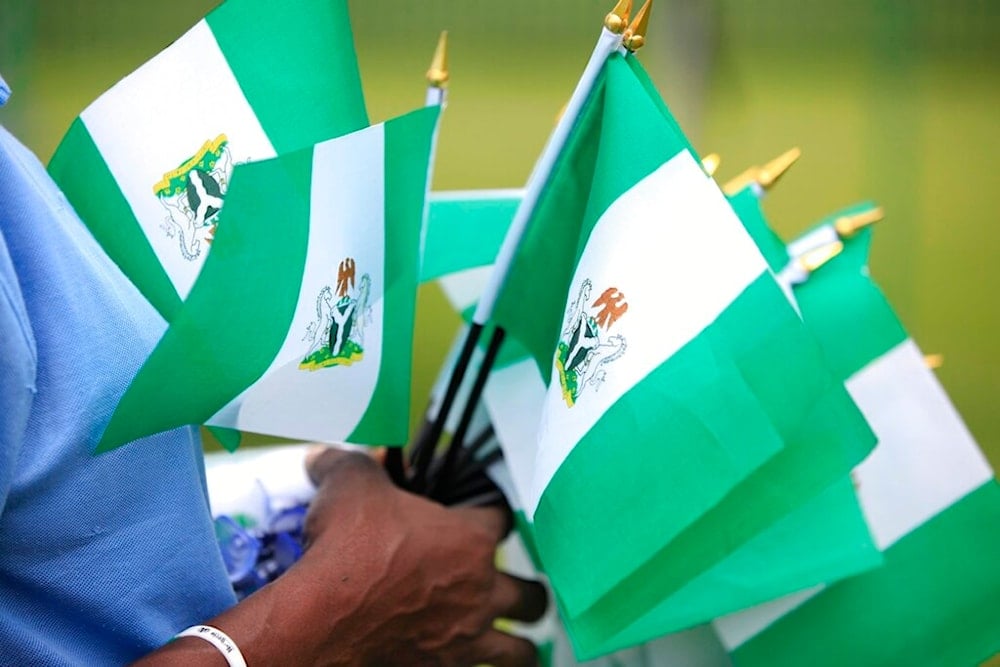Nigeria dismisses Trump's claims of Christian persecution
Nigeria has rejected US President Donald Trump's allegations of Christian persecution.
-

An unidentified woman sells Nigerian national flags during an event to mark Nigeria's independence day, in Lagos, Nigeria. Tuesday, Oct. 1, 2013 (AP)
Nigeria's Foreign Ministry has rejected comments by US President Donald Trump accusing the country of widespread persecution of Christians, calling the allegations inaccurate and politically driven.
Foreign Ministry spokesperson Kimiebi Ebienfa said on Saturday that Trump's remarks "do not reflect the situation on the ground," stressing that Nigerians of all faiths "have long lived, worked, and worshipped together peacefully."
The statement followed Trump's announcement on Friday urging US lawmakers Riley Moore and Tom Cole, along with the House Appropriations Committee, to investigate what he described as "mass killings of Christians in Nigeria by radical Islamists." He also said he had returned Nigeria to the US list of "Countries of Particular Concern," a designation that could pave the way for sanctions over alleged religious-freedom violations.
Religious leaders reject extremist claims
While Islamist insurgent groups such as Boko Haram and the Islamic State West Africa Province (ISWAP) have conducted attacks in parts of northern Nigeria, analysts and clerics stress that these movements do not represent Islam or the broader Muslim population. The Supreme Council for Islamic Affairs and other prominent Nigerian scholars have condemned their actions as un-Islamic, stressing that the violence stems largely from poverty, political corruption, and local grievances rather than religion itself.
The Nigerian government has consistently portrayed the insurgency as a national security challenge rather than a religious conflict, citing efforts to combat terrorism and promote interfaith harmony. "President Bola Tinubu remains firmly committed to protecting the lives and rights of all Nigerian citizens," Ebienfa said.
Trump's broader political framing
Trump's comments on Nigeria form part of a broader pattern in which he spotlights contentious foreign issues through a religious lens to appeal to his domestic political base. Earlier this year, he signed an executive order cutting US aid to South Africa, accusing its government of treating "certain classes of people VERY BADLY." Observers say both moves fit a familiar rhetorical template: identify a foreign country, claim persecution of a religious group, and call for US intervention.
Washington-Abuja tensions
The exchange comes amid growing criticism in Washington of Nigeria's handling of intercommunal violence. In October, US Senator Ted Cruz accused the Nigerian government of "facilitating the mass murder of Christians by Islamist jihadists," claiming that such groups have killed about 50,000 Christians since 2009.
In response, Nigerian authorities established a commission to investigate reports of violence against Christian communities.
Yet, the United States' moral posture toward Nigeria appears deeply inconsistent. Just weeks earlier, Responsible Statecraft revealed that Washington had approved a $346 million arms sale to Nigeria despite well-documented reports of civilian abuses by the same security units receiving US weapons. The State Department's own 2024 human rights report acknowledged arbitrary killings, disappearances, and sexual violence by Nigerian forces, yet the deal went forward.
Critics argue that while Washington publicly condemns Nigeria for “religious persecution,” it continues to arm and fund military units implicated in war crimes, exposing what many see as blatant US hypocrisy in its human rights discourse.
Read more: Nobel Laureate Soyinka says US visa revoked after criticizing Trump

 3 Min Read
3 Min Read








